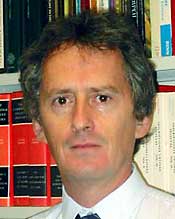UC Berkeley Web Feature
'Charts of Roman Time' lecture series to examine the uses of time in the formation of Roman culture
 Denis Feeney |
BERKELEY – The world of ancient chronography will be explored starting Wednesday, Feb. 4, in six free, weekly lectures at UC Berkeley by a renowned authority in the field of Roman literature and cultural studies.
Denis Feeney, Giger Professor of Latin at Princeton University, is the Visiting Sather Professor of Classical Literature in the Classics Department for spring 2004. He is credited with helping to revitalize the field of chronography.
The "Charts of Roman Time" topics, Feeney said, stem from his interest in the calendar poem, "Fasti," by the Roman poet Ovid. "Rather to my surprise, " he said, "as my interest in Ovid's time schemes grew, I found myself more and more drawn into the apparently off-putting world of ancient chronography."
Without a universally accepted dating scheme, Feeney said, ancient societies charted past time by a complex system of correlation, lining up significant events in the distinct time columns of different cities, each with their own calendars, dating systems, and eras. The historians of Greece had perfected a Panhellenic framework of cross-reference by the time the Romans came onto the stage of Mediterranean history, he said.
"I became increasingly interested in how the Romans charted their own past onto these Panhellenic grids of time," Feeney said. "This was a technical challenge of a high order for them, and it was a test case of the crisis of Roman Hellenization, as they made sense of the contours of their past through media that had been devised for Greek cities and empires."
His first two lectures will investigate what is at stake in such "synchronistic patterning," and how the Romans mapped themselves onto a Mediterranean past. The third lecture will delve into the ancient world's divisions between the time of myth and history.
The fourth lecture will examine the division between the times of the Gold and Iron Ages, the point at which, for the Romans, organized time comes into being along with the other appurtenances of civilisation. The talk will also examine the related long-standing fascination of the Romans with the possibility of a return to the lost Age of Gold.
The final two lectures will turn to the Romans' distinctive indigenous time grids, the schemes of organization seen in the consular lists and the Roman calendar.
Feeney is the author of "The Gods in Epic: Poets and Critics of the Classical Tradition" (1991), a sophisticated re-evaluation of the significance of the "divine apparatus" in Greek and Latin epic poetry and of the short and powerfully provocative "Literature and Religion at Rome: Cultures, Contexts, and Beliefs" (1998).
The Sather Professorship was founded by UC President Benjamin Ide Wheeler in 1914 through a bequest of noted UC Berkeley benefactor Jane K. Sather, and was organized in its current form in 1920 by Greek professors Ivan Linforth and George Calhoun. The invitation to be a Sather Professor is considered a crowning honor for classicists. The Sather Professor delivers public lectures and teaches a course. The lectures normally result in a book published by the University of California Press. So far, 63 volumes of Sather Classical Lectures have been published.
All of Feeney's lectures will take place in the Valley Life Sciences Building. Additional details are online.
Schedule of lectures:

